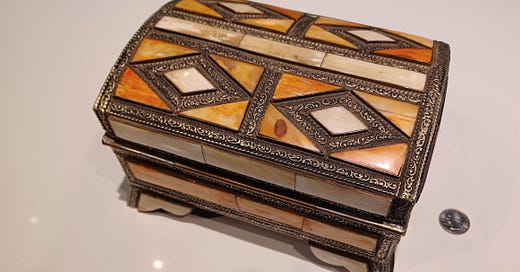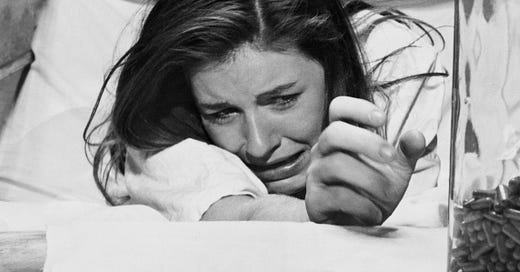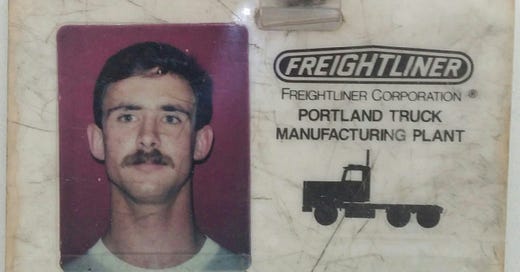
Behold, the dreaded Casket of Secrets. But first some blather.
In her essay collection Social Studies Fran Lebowitz includes a faux auction catalog of items — chipped dishes, threadbare towels — from her earlier life as a pre-published writer. She calls these items memento poori, and invents small descriptions for each, in the style of Christie’s or Sotheby’s. Each includes a grainy black-and-white photo of the item.
It’s a clever way to frame these souvenirs of poverty. In a context of wealth. It values the nostalgia for youth and hardship, while the essay celebrates leaving the shabby stuff behind.
This brings to mind an essay Truman Capote wrote for the first issue of the reinvented Vanity Fair. As legend has it Capote had promised the magazine a profile on the reclusive Greta Garbo, and Garbo had refused to talk. As a compromise, Capote had written the profile by creating a long inventory of every item visible in her apartment. Right down to the salt and pepper shakers in her kitchen. What resulted was a long example of person-as-possessions, just as Charles Foster Kane seemed to cobble himself together out of the riches of former monarchs… and his sled. Capote’s was a fascinating experiment, and because no one had done it before, it worked.
From the Unconfirmed Rumor Department: In 2014 when Maya Angelou died, her jewelry and clothing went to auction remarkably fast. Word in publishing was that her liquid assets were only worth around $65,000. In comparison, my father worked most of his life as a railroad brakeman and left an estate of around $88,000. It seems that through out her life Angelou had been incredibly generous and had given away money as quickly as she’d earned it. Inheritance taxes on intellectual property can be brutal — the government requires an assessment of value that includes all projected revenue from the books/songs/whatever going out a decade beyond the death, and the estate is expected to pay the taxes on all of that yet-to-be-realized revenue. This can leave the beneficiaries strapped for cash. Real estate must be sold. Thus Angelou’s heirs had to sell off her personal effects quickly, while her name was still hot. Still, it’s only stuff. Her legacy is her books.
Always keep in mind the equation: Stuff + Story = Value
Which brings us to the last item in our “enchanted objects” series.
But first, another tangent…
Here’s a lesson in allowing other people to determine the meaning and value in objects. In the past, readers would send me quartz crystals and specimens like “rose rocks.” These I’d put on a stone table in the forest, where they’d magically vanish. Local kids had run across the table and dubbed it the “Magic Rock Table.” They’d established the custom that each kid could only take one stone from the table during each visit. These might be clusters of amethyst crystals or bears carved from tigers eye or malachite boxes or jade elephants. Whatever the case, the kids would soon claim their stone could work magic. The stones could levitate or could dematerialize or rematerialize at will. The stones had the power to grant wishes. To date, whenever I find carved-pyrite hearts or rose quartz spheres I sneak them out to the Magic Rock Table where they continue to disappear.
My point is: You don’t have to make magic happen. People want magic to happen. You just have to provide an object upon which people can project their own fantasies.
That’s kind of how stories endure: Let your reader establish the deeper meaning.
Which brings us to the Casket of Secrets!
Here it is. Pillaged from a temple. Looted from a tomb. It contained a curse or a blessing. It once held the heart of Shelley — snatched from his chest during his cremation. It once held the frankincense presented at the Nativity. The chest was later found empty and abandoned aboard the doomed Mary Celeste. It sat on the bedside tables of both Anne Boleyn and Sunny von Bulow. As shown here, it’s bound in strips of embossed metal and panels of bone, thought by many experts to be human bone. History records that the casket brings either enormous fortune or misfortune to whomever comes into possession of it.
In the Comments below, please post your account of the infamous box. Either its genesis story, its entire legacy to date, or just one chilling anecdote. Don’t shy away from depicting an episode from the casket’s future, either. What will the casket bestow upon the next owner, or the owner beyond that? Meaning, you.
To the best writer goes the Casket of Secrets. I’ll give you until this coming Friday, okay? Post your hearts out.
In other news, the final Study Hall is this coming Thursday. Be there in spirit or in person. It’s free, just bring your own writing project. It was a worthwhile experiment.
Dear Banshee, the Star of the Abyss went out to you yesterday. Look for it later next week.



















-----
The Casket of Secrets:
House of Mirrors.
Pictures in pictures.
Reflecting reflections.
Fissures to fissures...
-----
Just wanted to say I love the magic Rock table your generosity has created ❤